自考英语(二)学习心得
高等教育自学考试英语二学习技巧

高等教育自学考试英语二学习技巧高等教育自学考试英语(二)学习技巧英语(二)大概是自学考试所有非英语专业的课程中最难通过的一门课程。
许多考生连续多次参加考试,成绩都不理想。
而且最让人左右为难、欲罢不能的就是每次考试都是50多分。
努力学习了半年,结果考试成绩比上次不是相差无几、就是甚至还低几分。
这真是让人伤透脑筋。
笔者认为要学好英语(二),需处理好以下几个方面的关系问题:一、应该处理好英语(二)这门课的学习任务与考试要求的关系问题按照现行的公共英语自学考试大纲的规定,英语(二)的教学目的是让学生能比较熟练地掌握英语基础知识,初步具备阅读一般性的英语专业书刊和资料的能力。
具体要求如下:1.语音:能拼读国际音标和比较流利地朗读课文,语音语调基本准确。
在考试中,虽然不考语音题,但具备一定的语音基础知识却是学好英语(二)的基础。
实际学习过程中,学生可以不要求发音准确,不要求英国音还是美国音的区别,不要求读或说的流畅动听,但会读会说却是必不可少的。
否则,整个学习将是十分艰难的,也是十分枯燥乏味的,学习成绩也必将大打折扣。
因此自考学生在语音学习方面应该做到会读单词和课文,并能说出自己的想法(理想的结果和标准类似于中央电视4 台的专题采访中那些专家学者的英语:发音不准,但能顺利表达自己的想法)。
但笔者不提倡学生在英语(二)的学习中从听录音或者练习口语人手,相反,应该按照教学大纲,从朗读课文入手。
将语音放在课文学习中提高。
1.词汇:英语(二)包括英语单词约3800个(其中中学阶段所学词汇1600个),词组约750 个,阅读量为50000 余词。
要求能流利地读出并说出词的语法特征(词类和形态变化),而且要能说出汉语词义,对比较常用的词要能英汉互译,拼写正确并记住固定搭配。
此外,还要了解基本的构词规则,记住常用前缀、后缀的意义并能根据他们猜测词性和词义。
这个任务说起来并不难,但是由于自考学生工作任务重、家庭责任大、学习时间少等原因,要完成这样的词汇量,几乎是难于上青天。
自考英语二类征文作文

学校下午练跆拳道作文感受300字英文回答:Today, I attended my first Taekwondo class at school. I was initially apprehensive, but my classmates were friendly and supportive, and I quickly found myself enjoying the experience. The instructor, Master Kim, was patient and knowledgeable, and he guided us through the basics of Taekwondo with great enthusiasm. We learned how to punch, kick, and block, and we even practiced some basic self-defense moves. I was surprised at how much fun I had, and I can't wait to attend my next class.I believe that Taekwondo is a great activity for both children and adults. It is a great workout, and it also teaches valuable self-defense skills. I would encourage anyone who is interested in learning more about Taekwondo to give it a try.中文回答:今天,我参加了学校的跆拳道课。
一开始我很紧张,但我的同学们都很友好和支持,很快我就发现自己很喜欢这种体验。
如何学好自考英语二考试

如何学好自考英语二考试首先,建立自信心。
学好自考英语二考试首先要有信心,相信自己能够通过考试。
不要过分担心考试的难度,要相信自己经过努力学习一定能够取得好成绩。
建立自信心可以提高学习的效率和积极性。
其次,规划学习时间。
学好自考英语二考试需要有一个明确的学习计划。
根据自己的时间安排和学习进度,合理安排每天的学习时间,确保每天能够有固定的时间和精力投入到英语学习中去。
第三,制定学习目标。
学好自考英语二考试需要设定明确的学习目标,比如每天学习一定数量的单词,每周完成一定数量的练习题等。
制定学习目标可以让自己有明确的方向,有目标地去努力学习。
第四,多渠道学习。
学好自考英语二考试需要通过多种途径进行学习,比如阅读英语文档、听英语新闻、看英语电视剧等。
通过不同的学习方式可以提高自己的英语综合能力,更好地掌握英语知识。
第五,记忆单词。
学好自考英语二考试需要大量的记忆单词。
可以通过不同的方式记忆单词,比如背单词书、使用APP背单词、在日常生活中使用英语等。
记忆单词是英语学习的基础,只有掌握了足够的单词才能更好地理解和应用英语知识。
第六,掌握语法知识。
学好自考英语二考试需要掌握一定的语法知识。
可以通过学习语法书、做语法练习题等方式来加强语法知识的掌握。
掌握了语法知识可以帮助我们更好地理解和运用英语。
第七,多练习。
学好自考英语二考试需要进行大量的练习。
可以通过做练习题、模拟考试等方式来检验自己的学习成果。
多练习可以帮助我们熟练掌握英语知识,增强自己的应试能力。
总之,学好自考英语二考试需要付出一定的努力和时间。
通过制定合理的学习计划、设定明确的学习目标、多渠道学习、记忆单词、掌握语法知识、多练习等方式,可以提高自己的英语水平,顺利通过考试。
希望以上建议对大家有所帮助,祝大家学习顺利,取得好成绩!。
自考英语二类征文作文

自考英语二类征文作文英文回答:In today's interconnected world, the ability to communicate effectively in multiple languages is becoming increasingly important. The study of English as a second language (ESL) offers numerous benefits, both for individuals and for society as a whole.Cognitive Benefits: Learning ESL enhances cognitive abilities such as memory, attention, and problem-solving. It also improves critical thinking skills, as students must analyze and interpret texts in a foreign language.Career Advancement: Proficiency in ESL opens up a wider range of career opportunities in fields such as business, education, healthcare, and diplomacy. It is particularly valuable in today's globalized economy, where English is the lingua franca of international communication.Cultural Understanding: Studying ESL provides insights into different cultures and perspectives. By engaging with foreign texts and media, learners gain a deeper appreciation for other ways of life and develop a more nuanced understanding of the world.Global Citizenship: In an increasingly interconnected world, ESL proficiency fosters global citizenship by promoting intercultural communication and understanding. It enables individuals to participate meaningfully in a global society and contribute to cross-cultural exchange.Personal Enrichment: Learning ESL can be a personally enriching experience. It exposes learners to new ideas, broadens their perspectives, and fosters a love of language learning. It also promotes self-confidence and enhances a sense of accomplishment.中文回答:学习第二语言英语的好处:认知益处,学习英语可以提高记忆力、注意力和问题解决能力。
自考英语二如何学好单词

自考英语二如何学好单词一、建立良好的学习习惯首先,建立良好的学习习惯是学好单词的关键。
每天坚持学习一定数量的单词,按照一定的计划和步骤进行,不要急于求成。
可以通过背单词软件、单词卡片或者制定自己的学习计划来帮助记忆单词。
在背单词的过程中,注意把单词记忆的时间分配得比较均匀,不要一次性记忆太多的单词,可以多次重复记忆,以加深印象。
二、选择适合自己的记忆方法记忆单词的方法有很多种,每个人都有自己适合的方法。
有些人比较适合通过背诵单词来记忆,有些人则更适合通过联想或者记忆单词的词根来记忆。
可以根据自己的特点选择适合自己的记忆方法。
另外,可以尝试使用一些记忆技巧,比如分组记忆、联想记忆、反复记忆等方法,来帮助记忆单词。
三、多维度记忆单词除了通过背诵单词来记忆外,还可以尝试从多个维度记忆单词。
比如,可以通过听、说、读、写多种方式来记忆单词,这样可以更全面地掌握单词的意义和用法。
另外,可以通过与实际使用联系起来的方式来记忆单词,比如在句子中使用单词、与其他单词进行搭配等方式,来帮助记忆单词。
四、保持长期学习记忆单词是一个长期的过程,需要持之以恒地坚持下去。
即使记忆了很多单词,也需要经常复习,以保持记忆的新鲜度。
可以定期复习过去已经学过的单词,这样可以巩固记忆,同时也能够发现并弥补记忆不足的地方。
五、勇于尝试在学习单词的过程中,应该勇于尝试去探索不同的记忆方法,去挑战一些比较难以记忆的单词,不要因为遇到困难就放弃。
可以通过和同学、老师讨论、互相交流,一起分享记忆单词的方法和经验,互相鼓励。
六、总结经验教训在学习单词的过程中,应该及时总结经验教训,发现问题并及时纠正。
比如,为什么有些单词容易记住,有些单词却难以记忆,是不是自己的学习方法不够科学,是不是遇到了某些特殊情况需要调整学习计划等。
通过总结经验教训,可以不断改进学习方法,提高记忆效率。
总之,记忆单词是一项繁重的任务,但只要有恒心和毅力,相信每个人都可以学好单词。
自考英语二难
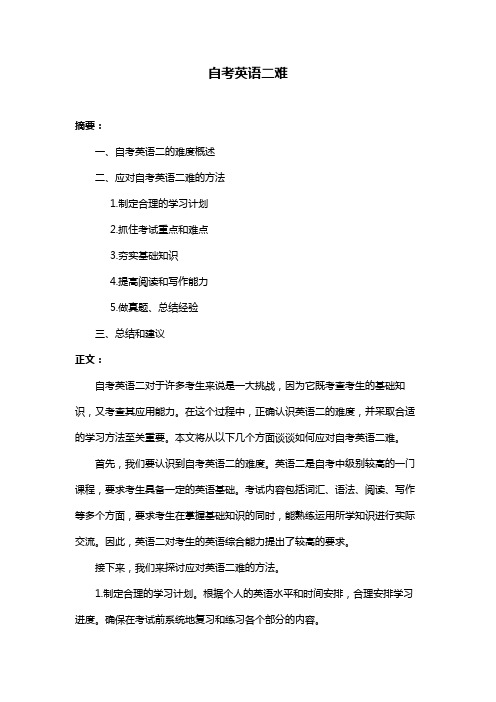
自考英语二难摘要:一、自考英语二的难度概述二、应对自考英语二难的方法1.制定合理的学习计划2.抓住考试重点和难点3.夯实基础知识4.提高阅读和写作能力5.做真题、总结经验三、总结和建议正文:自考英语二对于许多考生来说是一大挑战,因为它既考查考生的基础知识,又考查其应用能力。
在这个过程中,正确认识英语二的难度,并采取合适的学习方法至关重要。
本文将从以下几个方面谈谈如何应对自考英语二难。
首先,我们要认识到自考英语二的难度。
英语二是自考中级别较高的一门课程,要求考生具备一定的英语基础。
考试内容包括词汇、语法、阅读、写作等多个方面,要求考生在掌握基础知识的同时,能熟练运用所学知识进行实际交流。
因此,英语二对考生的英语综合能力提出了较高的要求。
接下来,我们来探讨应对英语二难的方法。
1.制定合理的学习计划。
根据个人的英语水平和时间安排,合理安排学习进度。
确保在考试前系统地复习和练习各个部分的内容。
2.抓住考试重点和难点。
针对英语二的要求,重点学习词汇、语法、阅读和写作等方面的知识。
在学习过程中,注意总结难点,并进行针对性的强化训练。
3.夯实基础知识。
英语二的基础知识主要包括词汇和语法。
考生应掌握至少5000个词汇,并能熟练运用常用语法结构。
为此,可以利用词汇书、语法书进行系统学习,同时通过做题巩固所学知识。
4.提高阅读和写作能力。
阅读和写作是英语二考试的难点,考生需要通过大量的阅读和实践来提高自己的写作能力。
可以阅读英文报刊杂志,积累素材,提高阅读速度和理解能力;并通过模仿和写作练习,提高写作水平。
5.做真题、总结经验。
通过做历年真题,了解考试题型和难度,总结经验教训。
在做题过程中,要注意分析自己的错误,查漏补缺,不断提高自己的应试能力。
最后,面对英语二难度,我们要保持积极的心态,坚定信心。
只要付出足够的努力和时间,相信自己一定能克服困难,取得优异的成绩。
总之,自考英语二虽然难度较大,但只要采取合适的学习方法,充分准备,考生们完全有能力应对。
小自考英语二实践报告

小自考英语二实践报告:探索英语学习的新路径**English Practice Report for Mini-Self-Exam English II: Exploring New Pathways in English Learning****English Section****Introduction**In the fast-paced world of globalization, theimportance of English proficiency has become increasingly evident. As a language that serves as a bridge between cultures, English plays a pivotal role in international communication, education, and business. The Mini-Self-Exam English II (MSE II) not only assesses one's Englishlanguage skills but also provides an opportunity to delve deeper into the language and explore innovative learning methods. This practice report aims to share my experiences, challenges, and insights gained through the MSE II journey. **Methodology**My approach to the MSE II was multi-faceted, encompassing various learning strategies. I began by analyzing my current English proficiency level, identifyingareas of weakness, and setting clear learning goals. I then employed a combination of traditional learning methods, such as textbooks and classroom instruction, along with contemporary techniques like online resources, podcasts, and language exchange partners. This blended learning approach allowed me to tap into different learning styles and maximize my learning potential.**Challenges and Solutions**One of the primary challenges I faced was improving my listening comprehension. To overcome this, I implemented regular listening practice, including watching English movies and listening to podcasts. Additionally, I utilized language exchange partners to practice speaking and listening in real-time, simulating real-world communication scenarios. Another challenge was enhancing my vocabulary. To address this, I implemented a daily vocabulary learning routine, incorporating new words into my daily conversations and writing.**Insights and Lessons Learned**Through my MSE II journey, I gained valuable insights into effective learning strategies. I realized theimportance of regular practice and the role of consistency in language learning. I also learned the value of using multiple resources and approaches to cater to different learning styles. Most importantly, I understood that language learning is not just about achieving grades; it's about enhancing communication skills and cultural understanding.**Conclusion**The MSE II has been a transformative experience, pushing me to push my English language boundaries. Through this process, I have discovered new learning methods, overcome challenges, and gained valuable insights. As I continue on my English learning journey, I carry these lessons with me, knowing that they will serve as a compass, guiding me towards fluency and cultural proficiency.**中文部分****引言**在全球化的快速发展中,英语熟练度的重要性日益显现。
如何学好自考英语二
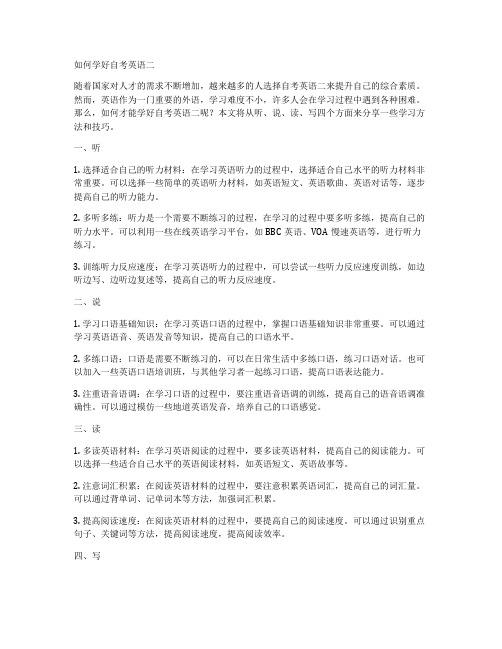
如何学好自考英语二随着国家对人才的需求不断增加,越来越多的人选择自考英语二来提升自己的综合素质。
然而,英语作为一门重要的外语,学习难度不小,许多人会在学习过程中遇到各种困难。
那么,如何才能学好自考英语二呢?本文将从听、说、读、写四个方面来分享一些学习方法和技巧。
一、听1. 选择适合自己的听力材料:在学习英语听力的过程中,选择适合自己水平的听力材料非常重要。
可以选择一些简单的英语听力材料,如英语短文、英语歌曲、英语对话等,逐步提高自己的听力能力。
2. 多听多练:听力是一个需要不断练习的过程,在学习的过程中要多听多练,提高自己的听力水平。
可以利用一些在线英语学习平台,如BBC英语、VOA慢速英语等,进行听力练习。
3. 训练听力反应速度:在学习英语听力的过程中,可以尝试一些听力反应速度训练,如边听边写、边听边复述等,提高自己的听力反应速度。
二、说1. 学习口语基础知识:在学习英语口语的过程中,掌握口语基础知识非常重要。
可以通过学习英语语音、英语发音等知识,提高自己的口语水平。
2. 多练口语:口语是需要不断练习的,可以在日常生活中多练口语,练习口语对话。
也可以加入一些英语口语培训班,与其他学习者一起练习口语,提高口语表达能力。
3. 注重语音语调:在学习口语的过程中,要注重语音语调的训练,提高自己的语音语调准确性。
可以通过模仿一些地道英语发音,培养自己的口语感觉。
三、读1. 多读英语材料:在学习英语阅读的过程中,要多读英语材料,提高自己的阅读能力。
可以选择一些适合自己水平的英语阅读材料,如英语短文、英语故事等。
2. 注意词汇积累:在阅读英语材料的过程中,要注意积累英语词汇,提高自己的词汇量。
可以通过背单词、记单词本等方法,加强词汇积累。
3. 提高阅读速度:在阅读英语材料的过程中,要提高自己的阅读速度。
可以通过识别重点句子、关键词等方法,提高阅读速度,提高阅读效率。
四、写1. 练习写作:写作是提高英语综合能力的重要方式,在学习的过程中要经常练习写作,提高自己的写作水平。
自考英语心得(通用3篇)
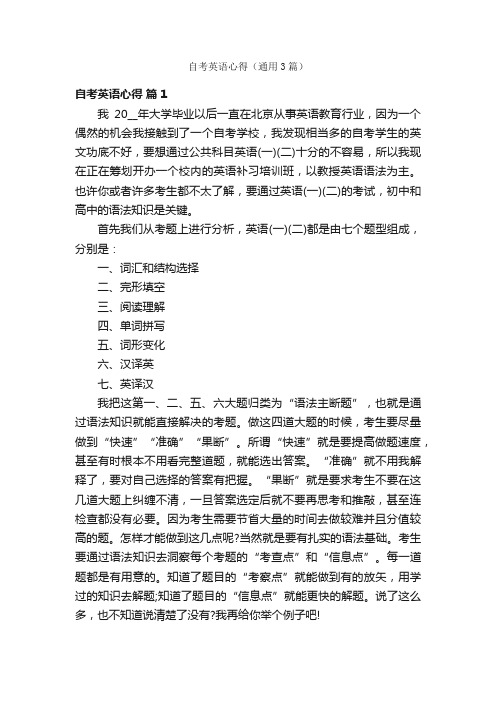
自考英语心得(通用3篇)自考英语心得篇1我20__年大学毕业以后一直在北京从事英语教育行业,因为一个偶然的机会我接触到了一个自考学校,我发现相当多的自考学生的英文功底不好,要想通过公共科目英语(一)(二)十分的不容易,所以我现在正在筹划开办一个校内的英语补习培训班,以教授英语语法为主。
也许你或者许多考生都不太了解,要通过英语(一)(二)的考试,初中和高中的语法知识是关键。
首先我们从考题上进行分析,英语(一)(二)都是由七个题型组成,分别是:一、词汇和结构选择二、完形填空三、阅读理解四、单词拼写五、词形变化六、汉译英七、英译汉我把这第一、二、五、六大题归类为“语法主断题”,也就是通过语法知识就能直接解决的考题。
做这四道大题的时候,考生要尽量做到“快速”“准确”“果断”。
所谓“快速”就是要提高做题速度,甚至有时根本不用看完整道题,就能选出答案。
“准确”就不用我解释了,要对自己选择的答案有把握。
“果断”就是要求考生不要在这几道大题上纠缠不清,一旦答案选定后就不要再思考和推敲,甚至连检查都没有必要。
因为考生需要节省大量的时间去做较难并且分值较高的题。
怎样才能做到这几点呢?当然就是要有扎实的语法基础。
考生要通过语法知识去洞察每个考题的“考查点”和“信息点”。
每一道题都是有用意的。
知道了题目的“考察点”就能做到有的放矢,用学过的知识去解题;知道了题目的“信息点”就能更快的解题。
说了这么多,也不知道说清楚了没有?我再给你举个例子吧!如20__年下半年的英语(一)试卷中有一道题:There are only four areas ____ very many diamonds have been found. A. whenB. where C. that D.which首先根据题目的意思和四个选项我们能知道本题考察的是“定语从句”,所以考生就要回忆定语从句的语法知识,本人因为审题不严,看到了“only”就将答案定位在C,实际上,只有当先行词在从句中充当名词成分时,并且先行词被“theonly\he same\\ next\\very等修饰时才能用引导词”that“,如:the only thing ___ is wrong with this is what my brother said to me theother day. A.which B. that C. whatD.where答案是B上道题的先行词在定语从句从是充当地点状语,所以用引导词“where”。
说说我学自考英语二的经验

说说我学自考英语二的经验引言自考英语二是自考英语考试中的一门重要科目,对于想要通过自考英语四级、六级考试的考生来说,学好英语二至关重要。
我在学习自考英语二的过程中,遇到了很多困难,但最终还是顺利地通过了考试。
在这篇文章中,我将分享我在学习自考英语二过程中的经验和方法。
学习方法1. 制定学习计划学习自考英语二需要制定详细而实际的学习计划。
首先,应根据考试大纲安排好每个单元的学习进度和复习时间,充分利用自己的时间,并尽可能在规定时间内完成所需要的学习内容。
其次,在学习过程中,需要不断地检查自己的学习进度,及时调整学习计划并提高学习效率。
2. 多做听、说、读、写练习想要在自考英语二中取得好的成绩,重视听、说、读、写练习是不可少的。
我们可以通过听英语新闻、看英语电影、读英语杂志等多种方式来提高自己的英语听、说、读、写能力。
在练习时,可以尝试着用英语表达自己的想法,不断地将自己暴露在英语环境中。
这样可以提高自己的英语听、说、读、写的全面能力。
3. 巩固基础知识自考英语二对语法和词汇知识的考查比较严格,因此,我们需要加强对语法和词汇的理解和记忆。
在学习过程中,我们可以使用英语语法书、英语词汇书等辅助材料,多做练习以巩固自己的基础知识。
4. 做题、做题、再做题在自考英语二考试中,做题是学习过程中必不可少的环节。
我们应该多做各种类型的题目,掌握考试的出题思路和方式。
然后,对做错的题目进行分析,找到解题思路和方法,以便于下一次顺利解题。
在做题的过程中,我们应该将自己的知识点具体的脉络化,掌握各种题型的套路,并且要针对性地进行训练。
学习经验1. 提前准备要想在自考英语二考试中取得好的成绩,提早准备就显得尤为重要。
在我准备自考英语二的过程中,我提前查找了各种资料,对考试内容进行了充分的了解和研究。
我也提前找到了几份历年真题的试卷,并抽出时间练习和做题,以便于更深入地了解考试的特点和命题方式。
2. 制定学习计划学习自考英语二需要制定详细而实际的学习计划。
如何学好自考英语(二)

如何学好自考英语(二)自考英语是通过自学,参加考试,获得相应的学历证书或文凭的一种教育形式。
自考英语通常包含听力、口语、阅读、写作等方面,这些方面都需要我们进行长期的学习和练习才能取得良好的成绩。
下面我将分享一些学习自考英语的方法,希望对你有所帮助。
一、制定学习计划学习自考英语需要有一个合理的学习计划,可以根据自己的实际情况来制定。
学习计划包括每天、每周、每月的学习目标和安排,明确目标是一件非常重要的事情,它可以帮助我们更加有针对性地学习,充分利用时间和精力。
在制定学习计划的同时,我们还要把握好学习的进度和节奏,不要让自己感到太过压力,也不要让自己感到太过轻松。
二、坚持每天学习学习英语需要持之以恒,每天都要花一定的时间来学习,不能有懈怠和懒惰的心态。
可以选择在早晨、中午、晚上碎片时间进行学习,也可以选择在周末或假期集中时间进行学习。
无论选择哪种方式,都要保持持续不断的学习,只有坚持下去,才能取得好的成绩。
三、多听多说多读多写学习英语的过程中,要注重听、说、读、写四种技能的全面发展。
可以通过听英语广播、看英语电影、参加英语角等方式来提高听力和口语能力;可以通过阅读英语文章、课本、报纸等方式来提高阅读能力;可以通过写英语作文、日记、短文等方式来提高写作能力。
多听多说多读多写,是学好英语的基本要求。
四、积累词汇和语法词汇和语法是学习英语的基础,只有掌握了足够的词汇和语法知识,才能在听、说、读、写等方面取得好的成绩。
可以通过背单词、做语法练习、阅读语法书籍等方式来积累词汇和语法知识。
同时,也可以通过参加英语角、与外国人交流、使用英语电子产品等方式来巩固和运用所学的知识。
五、做题刷题做题刷题是检验自己学习成果的一个重要方式。
可以通过做自考英语真题、模拟试卷等方式来检验自己的学习成果,看看自己在哪些方面还有不足之处,进行及时的调整和补救。
在做题刷题的过程中,也可以发现自己的学习方法和思维方式,进一步提高学习效率和学习质量。
高等教育自学考试《英语(二)》重点小结

你的对手在看书,你的仇人在磨刀,你的闺蜜在减肥,隔壁老王在练腰--你必须不断地努力,才能不让你的对手有可乘之机。 今天 给大家带来了自考英语(二)考试重点小结,我们现在一起来学习一下吧! 1.主谓一致的三条原则 (1)语法一致,即在语法形式上取得一致。 Humanbeingsenjoylearning. Everybody’sunderstandingisincomplete. (2)意义一致,即根据意义来处理一致关系。 Thepeopletherearefightingfortheindependenceoftheircountry. Tendollarswasalotofmoneyatthattime. (3)就近原则,即谓语动词的单、复数形式取决于最靠近它的词语。 Thereisapen,twopencilsandaneraserinthepencilbox. Neithertheboynorhisteachersknowtheanswer. 2.集体名词作主语时与动词的一致 (1)当主语为 furniture,equipment,machinery 等词时,谓语动词通常用单数。 ThefurnitureinthatshopisallmadeinChina. Officeequipmentisveryexpensivenowadays. (2)集体名词如 people,cattle,police,poultry 等往往作复数用。 Somepeopledrivemadlyinthiscountry.
1
Manycattlehavediedbecauseoftheflood. (3)family,government,class,committee,audience,team,public 等词被视作一个整体时,其后的动词用单数;被视为构成整体的个体 时,其后的动词则为复数。 Hisfamilyisahappyone. Hisfamilyareallinterestedinstampcollecting 3.并列主语与动词的一致 (1)当“名词+名词”表示一种事物时,用单数形式。 BaconandeggsisaverypopularBritishbreakfast. (2)当主语是由 and,both...and 连接的并列结构时,如果主语所指的不是一种事物,动词则用复数形式。 JackandMaryareinlovewitheachother. BothTomandJohnareabsenttoday. (3)在由 or 或 nor 连接的并列结构中,动词单、复数形式一般与 or 或 nor 后面的名词或代词保持一致。 Heorhisbrothersaretoblameforthis. Neithershenoryouaremistaken. (4)notonly...butalso 连接的结构作主语时,动词的单、复数形式依据 butalso 后的名词或代词。 NotonlyFredbutalsohisparentslovethissmallpetdog. Notonlytheboysbutalsotheirmotherisveryill. SubjectVerbAgreement(Ⅱ) 4.带确定数量词的名词词组作主语时的主谓一致 (1)当主语是表示数目、时间、重量、距离等的复数名词时,如果该名词所表示的数量看作一个整体,其后的动词用单数。
自学英语2作文总结
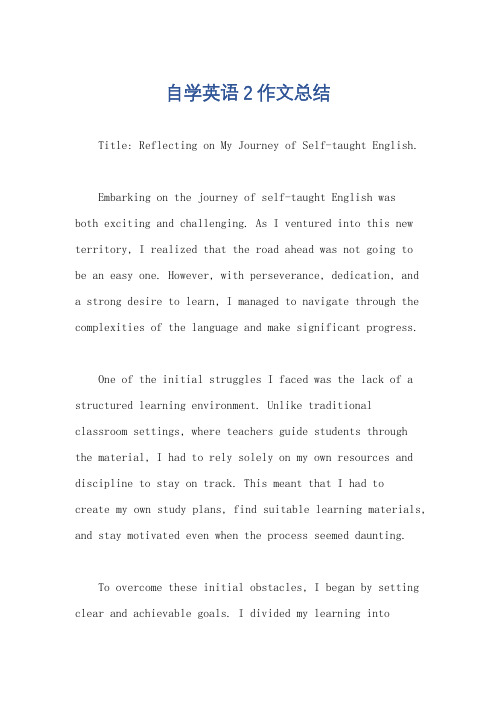
自学英语2作文总结Title: Reflecting on My Journey of Self-taught English.Embarking on the journey of self-taught English wasboth exciting and challenging. As I ventured into this new territory, I realized that the road ahead was not going to be an easy one. However, with perseverance, dedication, and a strong desire to learn, I managed to navigate through the complexities of the language and make significant progress.One of the initial struggles I faced was the lack of a structured learning environment. Unlike traditional classroom settings, where teachers guide students through the material, I had to rely solely on my own resources and discipline to stay on track. This meant that I had tocreate my own study plans, find suitable learning materials, and stay motivated even when the process seemed daunting.To overcome these initial obstacles, I began by setting clear and achievable goals. I divided my learning intomanageable chunks, focusing on one aspect of the language at a time. For instance, I dedicated initial weeks to mastering the basics of grammar, vocabulary, and pronunciation. As I progressed, I moved on to more complex topics like reading comprehension, writing skills, and listening comprehension.Another key aspect of my learning journey was the constant practice of speaking and listening. I realizedthat mere bookish knowledge was not sufficient; I needed to immerse myself in the language to truly master it. To this end, I started watching English movies and TV shows, listening to English music, and even joined online language exchange groups to practice speaking with native speakers.As I progressed in my learning, I encountered various challenges. There were times when I felt overwhelmed with the vast amount of material to cover, and there were also moments when I doubted my own progress. However, I learned to persevere and stay focused on my goals. I realized that every small step forward was a step towards my ultimate goal of fluency in English.Looking back on my journey, I am proud of the progress I have made. From being a complete beginner, I have now reached a level where I can communicate effectively in English, both verbally and in writing. My vocabulary has expanded, my grammar has improved, and my confidence in speaking the language has grown significantly.However, I also understand that the learning process is never-ending. There is always more to learn, and I am excited about continuing my journey of self-taught English.I look forward to exploring advanced topics, enhancing my language skills, and applying what I have learned to real-world situations.In conclusion, my journey of self-taught English has been an enriching and rewarding experience. It has taught me the importance of perseverance, discipline, and the power of constant practice. While the road ahead still holds many challenges, I am confident that with my newfound skills and the knowledge gained through this experience, I will continue to make progress and achieve my goals.。
自考英语二有关学习的范文

自考英语二有关学习的范文Title: The Journey of Self-Directed Learning in English.In the realm of education, self-directed learningstands as a beacon of independence and personal growth. Itis a path that demands discipline, motivation, and a thirst for knowledge. My journey in self-directed learning of English has been a transformative experience, one that has not only enhanced my linguistic skills but also shaped my understanding of the world.The genesis of my learning journey began with a simple desire to communicate. English, being the global languageof choice, holds the key to unlocking无数possibilities. It is the language of business, technology, and culture, connecting people across borders and backgrounds. Recognizing its significance, I embarked on a quest to master this language, determined to traverse the vast landscape of its vocabulary and grammar.My learning methodology was a blend of traditional and contemporary approaches. I leveraged the power of technology, utilizing online resources, interactive platforms, and mobile applications to enhance my learning experience. This blend of traditional textbooks and modern tools allowed me to immerse myself in the language, practicing conversation and comprehension through real-world simulations.The challenges were many, but the rewards were even greater. The intricacies of English grammar and thevastness of its vocabulary presented constant obstacles. However, with each challenge overcome, came a sense of accomplishment and growth. The key to my success was consistency and perseverance. I maintained a regular schedule for learning, dedicating hours each day to reading, writing, and speaking in English. This discipline allowed me to gradually build momentum, accumulating knowledge and confidence.The benefits of self-directed learning in English are profound. It has opened up a world of opportunities for me,both personally and professionally. Professionally, my enhanced English skills have helped me secure positions in multinational companies and participate in global projects. Personally, it has allowed me to connect with people from diverse cultures, broadening my horizons and enriching my life experiences.Moreover, self-directed learning has fostered a sense of autonomy and responsibility in me. It has taught me to take ownership of my learning, to identify my own strengths and weaknesses, and to seek out resources and strategies that work best for me. This sense of agency has not only been valuable in my academic pursuits but also in my life beyond the classroom.Looking ahead, my journey of self-directed learning in English continues. I am constantly exploring new resources and methods to further enhance my language skills. I am excited about the opportunities that lie ahead, confident that my English proficiency will enable me to navigate the global stage with ease and confidence.In conclusion, self-directed learning in English has been a transformative experience that has enhanced my linguistic skills, broadened my horizons, and fostered a sense of autonomy and responsibility in me. It is a journey that has been filled with challenges and rewards, one that has left me stronger, more confident, and eager to explore the world of knowledge that lies ahead.。
自考本科第二外语

自考本科第二外语英语作为世界上最为重要的第二语言,无论是在学术上还是在职场上,都具有重要的地位。
因此,在自考本科的学习过程中,学习第二外语是非常有必要的。
下面我将从三个方面来探讨自考本科第二外语的学习。
首先,学习第二外语可以提高语言能力。
学习一门新的语言,可以拓宽我们的语言视野,让我们对语言有更深入的了解。
通过学习第二外语,我们可以学到新的词汇、语法和语言结构,进而丰富我们的词汇量和语言表达能力。
学习第二外语还可以培养我们的口语和听力能力,通过与外语母语者的交流,我们可以提高我们的口语表达能力,同时也能更好地理解他人的意思。
此外,学习第二外语还可以培养我们的阅读和写作能力,通过阅读外文书籍和写作练习,我们可以提高我们的阅读理解能力和写作表达能力。
其次,学习第二外语可以拓宽我们的国际视野。
在全球化的今天,学习第二外语可以让我们更好地了解外国的文化、历史和社会情况。
通过学习第二外语,我们可以更好地与外国人交流,了解他们的思维方式和价值观,增进互相的了解和友谊。
同时,学习第二外语还可以为我们提供更多的就业机会和发展空间。
在许多职业领域中,对于掌握第二外语的人才需求量很大,具备第二外语的能力可以让我们在就业市场中占据更有竞争力的地位。
最后,学习第二外语可以锻炼我们的学习能力和自律能力。
学习一门新的语言是一项挑战,需要付出大量的时间和精力。
通过学习第二外语,我们可以提高我们的学习能力,学会如何有效地学习和记忆大量的语言知识。
同时,学习第二外语也需要我们保持一定的自律能力,需要坚持不懈地进行练习和复习,才能够取得良好的学习效果。
总之,学习第二外语对于自考本科学习来说非常重要。
它可以提高我们的语言能力,拓宽我们的国际视野,锻炼我们的学习能力和自律能力。
因此,我们应该积极投入学习第二外语的过程中,充分利用各种学习资源,提高自己的语言水平。
只有掌握了一门好的第二外语,我们才能更好地适应现代社会的发展需求,为自己的学习和职业发展打下坚实的基础。
自学英语2作文总结
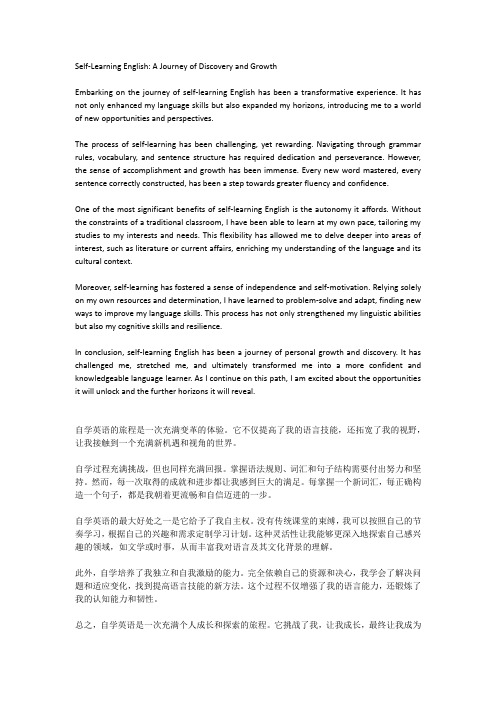
Self-Learning English: A Journey of Discovery and GrowthEmbarking on the journey of self-learning English has been a transformative experience. It has not only enhanced my language skills but also expanded my horizons, introducing me to a world of new opportunities and perspectives.The process of self-learning has been challenging, yet rewarding. Navigating through grammar rules, vocabulary, and sentence structure has required dedication and perseverance. However, the sense of accomplishment and growth has been immense. Every new word mastered, every sentence correctly constructed, has been a step towards greater fluency and confidence.One of the most significant benefits of self-learning English is the autonomy it affords. Without the constraints of a traditional classroom, I have been able to learn at my own pace, tailoring my studies to my interests and needs. This flexibility has allowed me to delve deeper into areas of interest, such as literature or current affairs, enriching my understanding of the language and its cultural context.Moreover, self-learning has fostered a sense of independence and self-motivation. Relying solely on my own resources and determination, I have learned to problem-solve and adapt, finding new ways to improve my language skills. This process has not only strengthened my linguistic abilities but also my cognitive skills and resilience.In conclusion, self-learning English has been a journey of personal growth and discovery. It has challenged me, stretched me, and ultimately transformed me into a more confident and knowledgeable language learner. As I continue on this path, I am excited about the opportunities it will unlock and the further horizons it will reveal.自学英语的旅程是一次充满变革的体验。
自考英语二有关学习的作文

自考英语二有关学习的作文English:Studying for the English Proficiency Test (EPT) requires dedication, time management, and effective study strategies. In order to succeed in the exam, it is important to allocate enough time each day to practice listening, reading, writing, and speaking English. One effective strategy is to set specific goals for each study session and use various resources, such as practice tests, textbooks, and online materials, to enhance language skills. Additionally, practicing with a language partner or joining a study group can provide opportunities for feedback and improvement. It is also crucial to cultivate good study habits, such as staying organized, managing time effectively, and taking regular breaks to prevent burnout. Lastly, maintaining a positive attitude and staying motivated is essential for driving consistent and continuous progress in English learning.Translated content:学习英语二级考试需要专注、时间管理和有效的学习策略。
自考英语二两个月60分
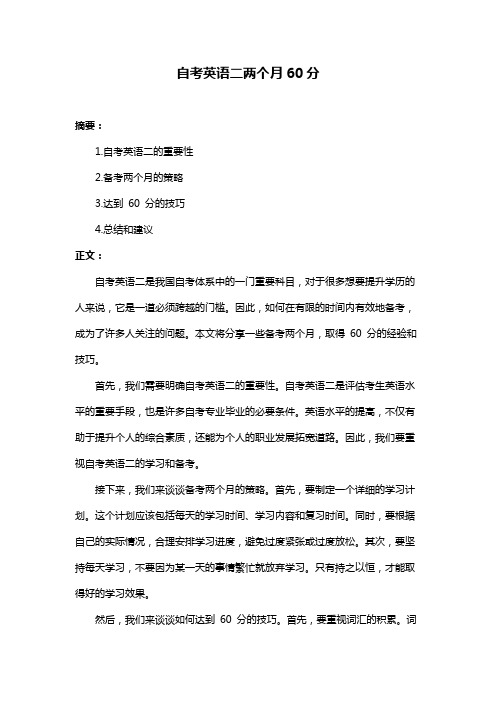
自考英语二两个月60分摘要:1.自考英语二的重要性2.备考两个月的策略3.达到60 分的技巧4.总结和建议正文:自考英语二是我国自考体系中的一门重要科目,对于很多想要提升学历的人来说,它是一道必须跨越的门槛。
因此,如何在有限的时间内有效地备考,成为了许多人关注的问题。
本文将分享一些备考两个月,取得60 分的经验和技巧。
首先,我们需要明确自考英语二的重要性。
自考英语二是评估考生英语水平的重要手段,也是许多自考专业毕业的必要条件。
英语水平的提高,不仅有助于提升个人的综合素质,还能为个人的职业发展拓宽道路。
因此,我们要重视自考英语二的学习和备考。
接下来,我们来谈谈备考两个月的策略。
首先,要制定一个详细的学习计划。
这个计划应该包括每天的学习时间、学习内容和复习时间。
同时,要根据自己的实际情况,合理安排学习进度,避免过度紧张或过度放松。
其次,要坚持每天学习,不要因为某一天的事情繁忙就放弃学习。
只有持之以恒,才能取得好的学习效果。
然后,我们来谈谈如何达到60 分的技巧。
首先,要重视词汇的积累。
词汇是英语学习的基础,也是提高阅读理解和写作能力的关键。
可以通过背单词书、做词汇练习来提高词汇量。
其次,要加强阅读理解的训练。
阅读理解是自考英语二中占比较大的一部分,可以通过多做真题、阅读英文文章来提高阅读理解能力。
最后,要注重写作的练习。
写作不仅可以提高语言表达能力,还能帮助巩固词汇和语法知识。
可以通过模仿范文、多写多改来提高写作能力。
最后,我们来总结一下。
自考英语二的备考是一个系统的过程,需要我们投入时间和精力。
只要我们制定合理的学习计划,坚持每天学习,注重词汇、阅读理解和写作的训练,就能在两个月内取得60 分的好成绩。
同时,我们也要明白,学习是一个持续的过程,只有不断地学习和积累,才能提高自己的英语水平。
总的来说,自考英语二的备考需要我们有计划、有毅力、有技巧。
自考本科英语2
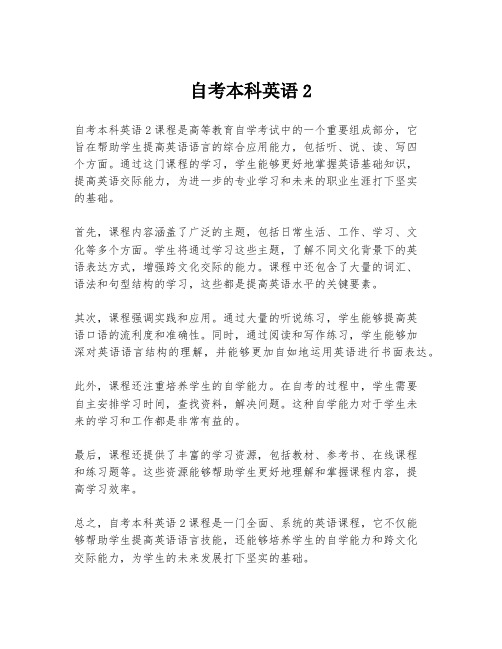
自考本科英语2
自考本科英语2课程是高等教育自学考试中的一个重要组成部分,它
旨在帮助学生提高英语语言的综合应用能力,包括听、说、读、写四
个方面。
通过这门课程的学习,学生能够更好地掌握英语基础知识,
提高英语交际能力,为进一步的专业学习和未来的职业生涯打下坚实
的基础。
首先,课程内容涵盖了广泛的主题,包括日常生活、工作、学习、文
化等多个方面。
学生将通过学习这些主题,了解不同文化背景下的英
语表达方式,增强跨文化交际的能力。
课程中还包含了大量的词汇、
语法和句型结构的学习,这些都是提高英语水平的关键要素。
其次,课程强调实践和应用。
通过大量的听说练习,学生能够提高英
语口语的流利度和准确性。
同时,通过阅读和写作练习,学生能够加
深对英语语言结构的理解,并能够更加自如地运用英语进行书面表达。
此外,课程还注重培养学生的自学能力。
在自考的过程中,学生需要
自主安排学习时间,查找资料,解决问题。
这种自学能力对于学生未
来的学习和工作都是非常有益的。
最后,课程还提供了丰富的学习资源,包括教材、参考书、在线课程
和练习题等。
这些资源能够帮助学生更好地理解和掌握课程内容,提
高学习效率。
总之,自考本科英语2课程是一门全面、系统的英语课程,它不仅能
够帮助学生提高英语语言技能,还能够培养学生的自学能力和跨文化
交际能力,为学生的未来发展打下坚实的基础。
- 1、下载文档前请自行甄别文档内容的完整性,平台不提供额外的编辑、内容补充、找答案等附加服务。
- 2、"仅部分预览"的文档,不可在线预览部分如存在完整性等问题,可反馈申请退款(可完整预览的文档不适用该条件!)。
- 3、如文档侵犯您的权益,请联系客服反馈,我们会尽快为您处理(人工客服工作时间:9:00-18:30)。
自考英语(二)复习方法导语:为便于同学们更好地进行复习,并在考试中取得好成绩,现结合高自考英语(二)的考试题型,介绍应试技巧并提出复习建议,供同学们参考。
近几年出题趋势的大致分析考试大纲根据英语(二)的要求和自学考试的特点设计了七种题型:词汇与结构、完型填空、阅读理解、单词拼写、词形变化、汉译英、英译汉。
试题构成请看下表:题型名称题量分值来源性质词汇与结构10 10 书内客观题完型填空10 10阅读理解30 30单词拼写10 10词形变化10 10汉译英 5 15 主观题英译汉 1 15 书外词汇和结构选择填空题(Vocabulary and Structure)一、题解:顾名思义,“词汇和结构”,那肯定是考查语法结构和词语用法搭配。
在本题中,语法题约占一半,它主要考查关联词、介词和代词的应用。
当然此题中也可能有考查动词、形容词和副词的形态变化的内容,以及词义选择方面的内容。
二、语法部分考试重点:语法要全面学习重点掌握。
不仅要复习下册的语法内容,还要重点复习(上册)有关语法内容。
词法:主要考查名词、代词、数词、形容词、副词、介词以及动词的用法:1.名词:主要考查名词的数2.代词:重点代词的考查either…or,neither…nor 搭配; few, a few, little, a little 的区别;other, another, the other, others的区别;other 指另外的人或物;others 泛指别人,可与some 连用;the other 指两个中的另一个,常和one 连用;the others 表示其余所有的人或物;another 则泛指另一个。
Some pupils are reading the text loudly, while other students are doing their homework.Some pupils are reading the text loudly, while others are doing their homework.Mrs. Clark has two beautiful hats. One is red, the other is blue.This suit doesn't fit me. Would you please show me another one?3.数词:序数词、分数的表达序数词:the first, the second, the third, the forth…..分数:三分之二,two thirds ;四分之三,three fourths ;one hundred ,two hundred (正),two hundreds (误) ;hundreds of (正) ,two hundreds of (误);4.形容词和副词:比较级、最高级,以及比较句式少数形容词和副词的变化是不规则的原级比较级最高级good, well better bestbad, badly, ill worse worstmany, much more mostlittle less leastfar farther, further farthest, furthestold older, elder oldest, eldestfarther 与further 都是far 的比较级和最高级,但是farther 指具体含义的“更远”,further指抽象含义的“更远”,有“进一步”的意思。
Elder 与eldest 也是old 的比较级和最高级,主要表示兄弟姐妹的长幼关系。
比较结构:1). … as + 形容词、副词原级+ as …The tree is as tall as the building.He is as busy as before. 他还是像以前那样忙。
2) … as + 形容词+(a)+ 名词+ as …We'll give you as much help as we can.He wants to be as great a scientist as Newton .3) 表示倍数:倍数+ as + 原级+ asFresh fruit costs twice as much as canned fruit. 新鲜水果的价钱比罐头水果贵一倍。
4) … not as /so + 原级+ as …I'm not so experienced as you think.I haven't made as much progress as I should. 我没有取得应有的进步。
I don't sing popular songs half so well as you. 我唱流行歌曲还没有你一半好。
(not) more/less/fewer … than (不)比…更no more … than 与…同样不5) 比较级+thanThis bed is more comfortable than the other. 这张床比那张要舒服。
She goes to school earlier than the other classmates.她上学比其他同学都早。
注意:比较级前可加表示程度的状语,如:a little, a bit, slightly, a lot, by far, somewhat等。
This room is far/ much cooler than that one. 这间屋子比那间要凉快得多。
6) the +形容词比较级… ,the +形容词比较级表示越…就越…Actually, the busier he is, the happier he feels. 事实上,他越忙越高兴。
According to Dr. Krammer, _______ people who appear in your dreams, ______ you are on awakening.A. as many … as happyB. the more … the morehappyC. the mor e … the happierD. the most … thehappiest5.介词:主要掌握介词与某些其他词的固定搭配关系,考前要重点复习上册第12单元和下册第7单元的语法讲解和语法练习,书后所附的词组表也是复习的重点。
常考的介词搭配如:as to, as for, substitute for, lay aside, in terms of ; result in, result from, as a result of, be concerned about / be concerned for, rely on, live on, lie in, consist of, be satisfied with, look up, in addition to, regardless of, despite, in spite of, contribute to, at least,in terms of, in accordance with, in line with, except, except for, due to, owing to, vary from …to, attach to, be irrelevant to, distinguish …from, 等等。
6.动词:主要考查动词的时态、语态、语气和非谓语动词及情态动词。
情态动词+ have done 的形式。
You needn't ______ him about this since he could find out for himself.A. tellB. be tellingC. have toldD. have to tellLots of empty beer bottles were found under the young man's bed; he _____ heavily.A. must have drunkB. must drinkC. should drinkD. had to drink_______ they began to get down to business.A. The holidays are overB. The holidays were overC. The holidays being overD. The holidays had been over7.句法:重点是各种从句以及倒装句、强调句的用法。
考前要重点复习上册第15、16、17、19、20单元的语法讲解例句和语法练习。
主语从句:what, that 区别;例如:It is becoming increasingly clear to policy –makers _______ schools cannot solve all the problems of the larger community.A. thatB. whatC. whenD. who同位语从句:注意一般由that 引导,先行词经常为, idea, doubt, thought, fact, belief。
There is no doubt _____ a large number of people have benefited from heart surgery.A. whatB. ofC. ifD. thatOn the other hand concern is also growing about the possibility of a new economic order _______ resource-rich nations of the Third World would combine to set high commodity prices.1A. whichB. whatC. thatD. in thatSuch attitudes amount to a belief ____ leisure can and should be put to good use.A. whichB. ifC. whetherD. that定语从句:引导定语从句的关系代词和关系副词;that, which的区别;介词+ which 的用法。
Astronomers and scientists think that a black hole is a region of space ____ Which matter has fallen and _____ which nothing can escape.A. towards … towardsB. into … fromC. out of … fromD. through … throughAs 引导的定语从句Such people ______ you describe are rare nowadays.A. asB. thatC. whoD. which状语从句:引导各种从句的关连词。
